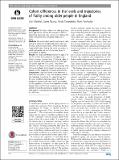Cohort differences in the levels and trajectories of frailty among older people in England
Abstract
Background The level of frailty in the older population across age cohorts and how this changes is a factor in determining future care costs and may also influence the extent of socioeconomic and gender inequalities in frailty. Methods We model cohort-specific trajectories in frailty among the community dwelling population older than 50 years, using five waves (2002–2010) of the English Longitudinal Study of Ageing. We stratify our analysis by wealth and gender and use a frailty index, based on accumulation of ‘deficits’. Results For males and females between the ages of 50 and 70 in 2002, frailty trajectories for adjacent age cohorts converge. However, levels of frailty are higher in recent compared with earlier cohorts at the older ages (for cohorts aged over 70 in 2002). These cohort differences are largest in the poorest wealth group, while for the most affluent, frailty trajectories overlap across all adjacent cohorts suggesting no change across cohorts. Conclusions A key driver of the cohort differences in frailty that we observe is likely to be increased survival of frail individuals. Importantly, this paper illustrates that the social conditions experienced across the wealth distribution impacts on the rate of deficit accumulation in older populations. Our results on trajectories of frailty between 2002 and 2010 are pessimistic and, in the context of rising life expectancies, suggest that poorer older people in particular spend additional years of life in a frail state.
Citation
Marshall , A D , Nazroo , J , Tampubolon , G & Vanhoutte , B 2015 , ' Cohort differences in the levels and trajectories of frailty among older people in England ' , Journal of Epidemiology and Community Health , vol. 69 , no. 4 , pp. 316-321 . https://doi.org/10.1136/jech-2014-204655
Publication
Journal of Epidemiology and Community Health
Status
Peer reviewed
ISSN
0143-005XType
Journal article
Description
This work was supported by the Medical Research Council and Economic Research Council through the Lifelong Health and Wellbeing programme (grant reference: G1001375/1).Collections
Items in the St Andrews Research Repository are protected by copyright, with all rights reserved, unless otherwise indicated.

